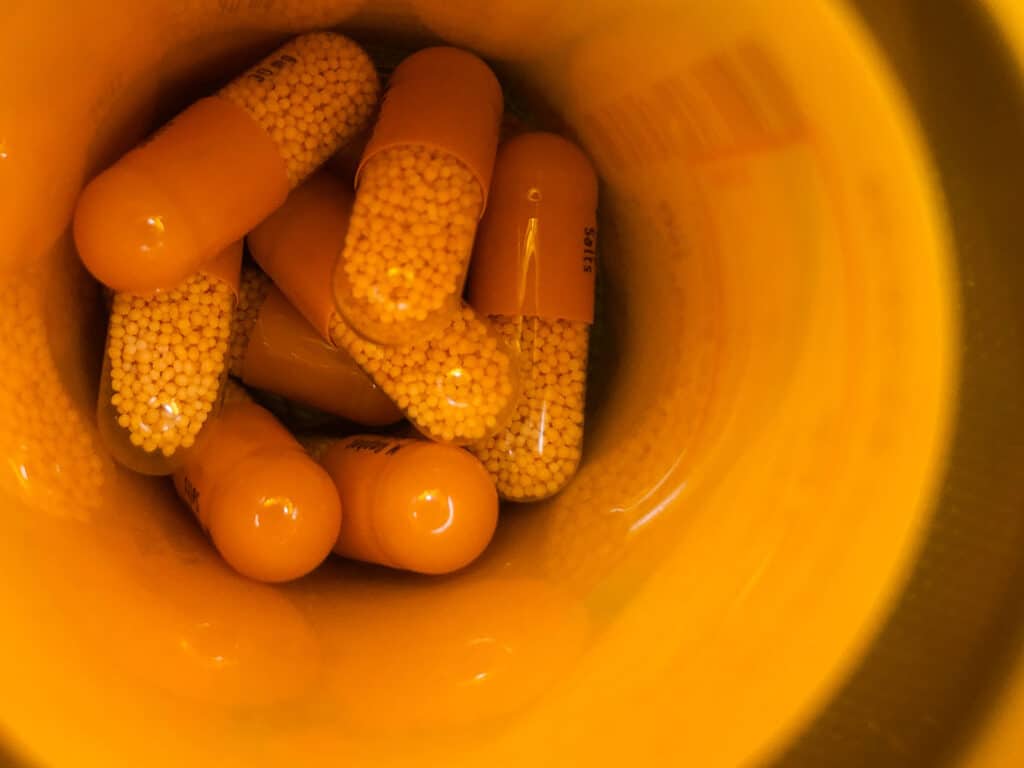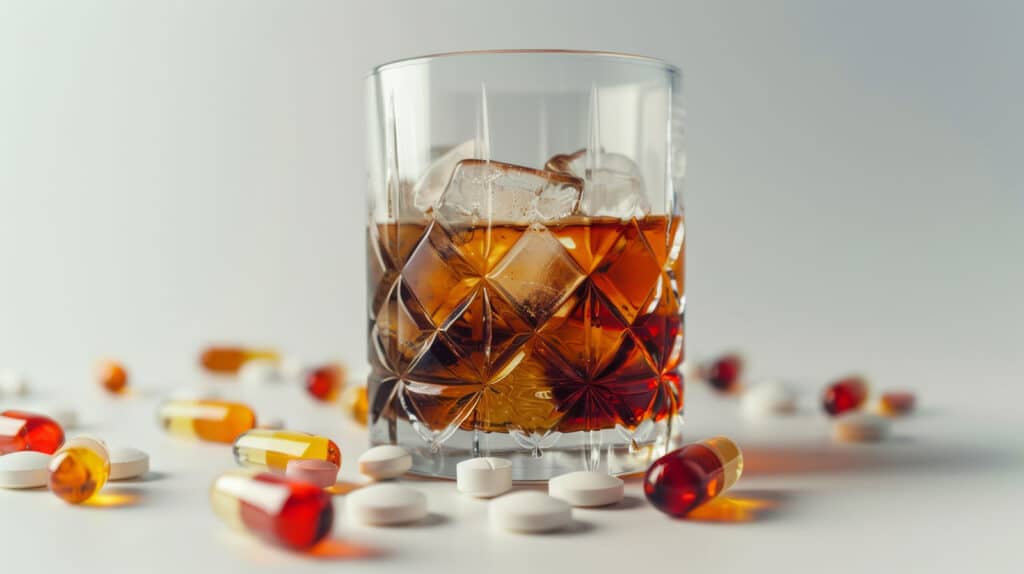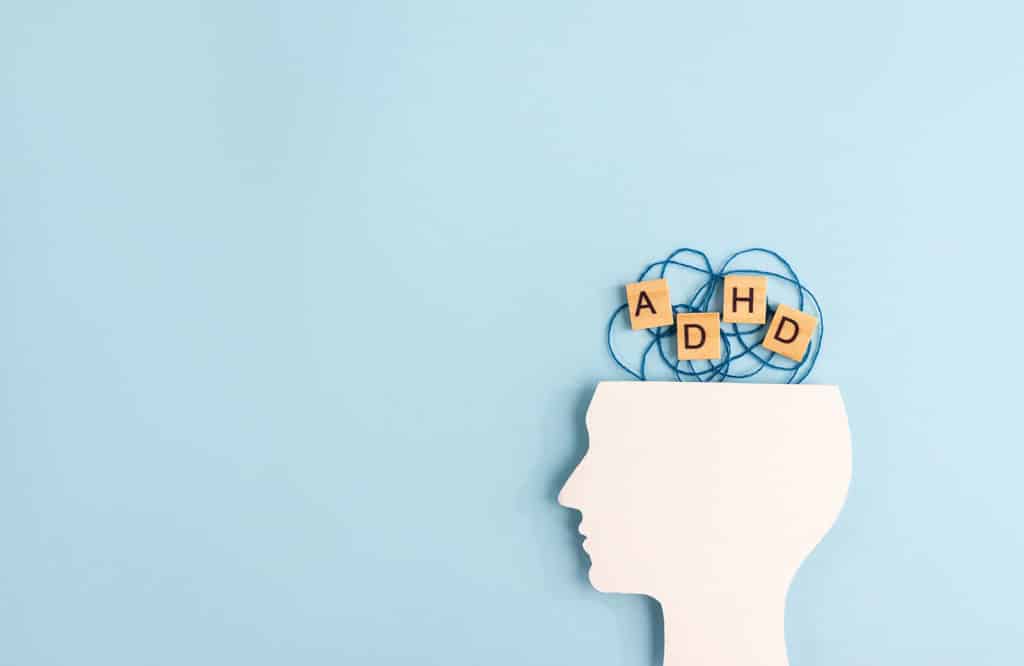Adderall, a prescription stimulant commonly prescribed for ADHD medication or narcolepsy, works by increasing dopamine levels in the brain to improve focus and reduce impulsivity. However, combining Adderall with alcohol—referred to as mixing Adderall—can have serious health implications.
Table of Contents
The Dangers of Mixing Adderall with Alcohol
Adderall is a stimulant medication that enhances alertness and energy, while alcohol is a depressant that slows down the central nervous system. When these substances are mixed, the stimulant effects of Adderall can mask the sedative properties of alcohol, making it harder to recognize how impaired you truly are. This can lead to overconsumption and increase the risk of alcohol abuse, alcohol addiction, or alcohol use disorder.

Polysubstance Use Risks
Combining Adderall with alcohol falls under polysubstance use, which amplifies the dangers associated with both substances. Risks include:
- Symptoms of alcohol poisoning being masked by the stimulant effects of Adderall.
- Increased likelihood of risky behaviors due to impaired judgment.
- Greater strain on the heart and risk of serious complications, especially when using extended-release formulations or high doses of Adderall.
Impacts on Physical and Mental Health
- Mixing these substances can worsen symptoms of alcohol use, such as dehydration, drowsiness, and poor coordination.
- Long-term misuse of Adderall and alcohol may contribute to substance abuse or substance use disorder.
- Adderall, which contains amphetamine and dextroamphetamine, can increase heart rate and blood pressure, compounding the risks when combined with alcohol.
Avoiding Drug and Alcohol Interactions
For individuals prescribed prescription drugs like Adderall, avoiding alcohol is essential to prevent these risks. Always consult a healthcare provider for guidance on safe use of prescription medication and to address concerns about drug use or substance abuse.
By understanding the dangers of mixing Adderall with alcohol, you can make informed choices to protect your health and well-being.

Why Shouldn’t You Drink After Using Adderall?
Drinking alcohol after using Adderall is dangerous because it can mask the effects of alcohol, leading to an increased risk of alcohol poisoning. Adderall’s stimulant properties may make you feel less impaired than you actually are, causing you to drink more than you realize or safely should.
The Risk of Overdrinking
As you consume more alcohol, the likelihood of alcohol overdose increases. After about four drinks, you lose the ability to safely drive or engage in activities requiring muscle control and coordination. Consuming five or more drinks can severely impair the nervous system, dulling pain and further reducing your ability to recognize danger or harm.
Compounding Risks with Adderall
Adderall’s effects combined with alcohol can further lower inhibitions, making risky behaviors more likely. This combination heightens the danger of serious injuries, internal bleeding, or other life-threatening complications. If you suspect alcohol poisoning or experience symptoms such as confusion, vomiting, seizures, or difficulty breathing, seek medical attention immediately.
The safest approach is to avoid combining Adderall and alcohol altogether to prevent these severe risks and protect your health.

How Long After Adderall Can You Drink Alcohol?
Let’s assume that you aren’t addicted to either Adderall or alcohol and simply want to avoid mixing the two by accident. In most cases, Adderall will be completely out of your system within 72 hours after you last use it. Of course, your gender, age and body type will all play a role in determining how long you have to wait. If you have any concerns about using alcohol after taking Adderall, your doctor should be able to answer them for you.
If you are struggling to control symptoms of ADHD, Adderall and other forms of therapy can help. However, if you are struggling to control your Adderall use or feel as if you’ve become dependent on other substances in addition to Adderall, the folks at Illinois Recovery Center can help. We offer plans tailored to your needs so that you can achieve a lasting recovery in a timely and affordable manner. Don’t hesitate to contact us today to learn more about our services and how to start treatment today.
Alcohol Can Make Your ADHD Worse
Excessive alcohol consumption can lead to symptoms commonly attributed to ADHD such as anxiety, impulsiveness or intrusive thoughts. You may also have trouble eating or sleeping while under the influence of alcohol or as the alcohol gets flushed through your system.
You may also feel restless or disorganized in the aftermath of a single night of drinking. This is because alcohol can actually deplete the dopamine reserves in your brain, which can amplify the effects of your disorder even if you are using drugs such as Adderall.

Adderall May Reduce Your Urge to Drink
You may feel as if Adderall will reduce your ability to have a normal social life if you can’t drink while taking it. The good news is that it may actually reduce your urge to drink as it helps to relieve symptoms that you generally turn to booze to control.
Therefore, you may not miss going to the bar on a Saturday night or manage to go to a party without feeling like you have to drink. Your body will continue to thank you when you’re able to get to sleep after a night out and be ready for what the next day brings.
If necessary, you could swap out a mixed drink for a mocktail, which substitutes alcohol with fruit or other tasty flavors. Having a drink in your hand may help keep you occupied and feeling as if you’re fully invested in the night’s events.
It’s Important to Take Adderall Properly
Adderall is a Schedule II drug with a high potential for misuse. When taken as prescribed, it can help alleviate symptoms of restlessness and anxiety, improving your quality of life. However, misusing Adderall can lead to dependence and a host of serious adverse effects.
The Dangers of Misuse
Misusing Adderall often begins with taking higher doses than prescribed or altering the method of consumption, such as snorting or smoking. While these methods might provide a temporary high, they can have severe consequences for your body, particularly the central nervous system.
Potential side effects of Adderall misuse include:
- Heart problems: Elevated heart rate, increased blood pressure, and even heart attack in severe cases.
- Disruption of body temperature regulation, leading to overheating or chills.
- Damage to the cardiovascular system, which can result in long-term health issues.
Withdrawal Symptoms
If you stop taking Adderall after a period of misuse, you may experience a range of withdrawal symptoms, such as:
- Insomnia and difficulty sleeping.
- Reduced appetite.
- Feelings of paranoia, anxiety, or depression.
- Physical symptoms such as dizziness, nausea, or irregular heartbeat.
These symptoms can be both physically and mentally challenging, making it essential to seek medical supervision when discontinuing Adderall after misuse.
Use Adderall Responsibly
Adderall misuse can cause lasting harm to your brain, internal organs, and overall health. To avoid these risks, always take Adderall as prescribed and consult your doctor if you feel the medication is no longer effective. Misusing the drug may not only worsen your condition but also increase the likelihood of serious adverse effects on your cardiovascular system and beyond.

What to Do If You Can’t Control Your Adderall Use
Struggling to control your Adderall use may indicate dependency, especially if continued use negatively affects your relationships, employment, or finances. Additional signs of addiction include increasing your dosage without medical guidance or using Adderall prescribed to someone else. Fortunately, there are effective treatment options to help you overcome addiction and regain control of your life.
Step 1: Seek Professional Help
The first step in addressing Adderall addiction is to seek support from a doctor, therapist, or other healthcare professional. They can assess your condition and recommend appropriate treatment programs tailored to your needs. For many, enrolling in a comprehensive addiction treatment program is an essential step toward recovery.
Step 2: Choose the Right Treatment Program
Inpatient Treatment
Inpatient programs provide a structured and controlled environment for individuals undergoing detox. These programs ensure round-the-clock medical supervision, which is crucial for managing withdrawal symptoms such as frequent vomiting, hallucinations, or severe cravings. Inpatient programs often last 30-60 days and focus on creating a personalized treatment plan that includes therapy, medication, and emotional support.
Outpatient Treatment
Outpatient programs are a great option for those who need flexibility while maintaining their sobriety. These programs allow you to continue with daily responsibilities while participating in therapy, group meetings, and medication management. Outpatient care often follows inpatient treatment and is a critical component of long-term recovery. Many individuals remain in some form of outpatient care indefinitely, as addiction requires ongoing support.
Step 3: Commit to Long-Term Recovery
Recovery from Adderall addiction is a lifelong journey that often requires a comprehensive approach, including therapy, support groups, and medication management. A strong treatment plan should incorporate strategies to maintain sobriety, rebuild relationships, and address triggers that could lead to relapse. Programs offering behavioral therapy, group therapy, and individualized counseling are particularly effective in supporting long-term recovery.
Adderall misuse can pose an increased risk of serious health consequences, including life-threatening complications, particularly among vulnerable groups like college students who may misuse the drug to cope with academic pressures. Seeking professional medical advice and healthcare support ensures that recovery is not only effective but also safe.
If you or a loved one is struggling with Adderall addiction, don’t wait to seek help. Reach out to a mental health professional or a treatment program to explore options tailored to your needs. By taking the right steps, you can overcome addiction and build a healthier, more productive future.



